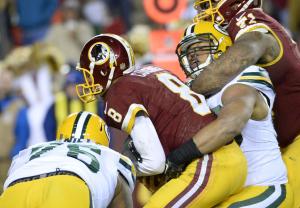WASHINGTON, May 19 (UPI) — Undoubtedly one of the most controversial monikers in any sports league, the name of the NFL’s Washington Redskins, is apparently not offending the people you may have thought would be most upset by it — Native Americans.
According to a new poll by The Washington Post, nine out of ten Native Americans questioned said they have no problem with the mascot.
About 500 people were surveyed in the poll, conducted over a five-month period, and most said they don’t find the name offensive. Those answers were largely consistent among the indigenous members regardless of age, income, education, political party or proximity to reservations, the Post said.
Seven in 10 responded that they believe the term “Redskin” is not disrespectful. Additionally, 80 percent said they wouldn’t take offense if they were called that term by a non-native. The Native American demographic most upset by the term (19 percent) identified themselves as liberal, according to the survey.
The poll has a margin of error of 7 percentage points, the Post said.
The pro football team has taken substantial criticism for the name in recent years — an issue that has permeated all sports, most notably the U.S. collegiate athletics ranks. Thursday, team owner Dan Snyder, who has long pledged to keep the name, applauded the survey.
“The Washington Redskins team, our fans and community have always believed our name represents honor, respect and pride,” he said. “Today’s Washington Post polling shows Native Americans agree. We are gratified by this overwhelming support from the Native American community, and the team will proudly carry the Redskins name.”
“I’m not ashamed of that at all. I like that name,” Barbara Bruce, a Chippewa teacher from North Dakota, added.
Others, though, expressed disappointment with the poll’s findings.
“I just reject the results,” Suzan Harjo, who belongs to the Cheyenne and Hodulgee Muscogee tribes, said. “I don’t agree with them, and I don’t agree that this is a valid way of surveying public opinion in Indian Country.”
Harjo was a plaintiff in a lawsuit seeking revocation of the team’s federal trademark protection. The Trial and Appeal Board of the U.S. Patent and Trademark Office acted in 2014 to remove protections for the team name because federal law says no trademarks can be a name considered derogatory or discriminatory.
A federal appeals court ruled in December, though, that such restriction of trademarks violates the First Amendment.
For years, activists have campaigned for the team to drop the name because it’s considered by some a racial epithet.
In 2005, the National Collegiate Athletics Association (NCAA) essentially mandated all universities under its leadership with Native American-themed mascots to change them. A few, however, including Florida State University (Seminoles) and the University of Utah (Utes), received an exemption after furnishing documented proof that their respective tribes supported use of the names.
The Change the Mascot campaign said in a statement it wasn’t surprised by the findings.
“The results of this poll confirm a reality that is encouraging but hardly surprising: Native Americans are resilient and have not allowed the NFL’s decades-long denigration of us to define our own self-image,” Oneida Nation Representative Ray Halbritter and National Congress of American Indians Executive Director Jacqueline Pata said in a joint statement. “However, that proud resilience does not give the NFL a license to continue marketing, promoting, and profiting off of a dictionary-defined racial slur — one that tells people outside of our community to view us as mascots.”
The feeling among fans is also largely supportive of the name. A 2014 national ESPN poll found just 23 percent calling for a name change.
There are 5.4 million American Indians and Alaska Natives, including those of more than one race, the U.S. Census Bureau said in 2014 — which represents 2 percent of the total population.

COMMENTS
Please let us know if you're having issues with commenting.